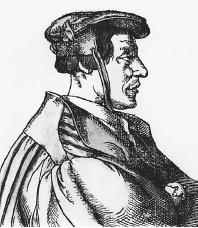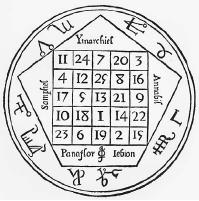Magi
Agrippa (1486–1535)
Henry Cornelius Agrippa von Nettesheim, author of The Occult Philosophy,(1531) one of the most influential works in Western occultism, was an accomplished physician, soldier, and occultist who traveled widely throughout Europe. More commonly known as Agrippa, the versatile magus envisioned magic as a blend of scientific knowledge, religious doctrine, and occult secrets. While his intellect brought him fame, wealth, and political favor, the turbulent times in which he practiced his craft also brought him condemnation, poverty, and prison. Agrippa became immersed in the supernatural and the occult and sought to develop a synthesis that would unite various magical systems and religious traditions with the Kabbalah.
While in Paris on a mission for the Emperor Maximilian I (1459–1519), Agrippa formed a secret society with a group of like-minded scholars and noblemen. The pact they vowed to uphold envisioned a reformed world, and they pledged to come to one another's assistance whenever needed. Later, when their efforts to restore one of their members to his former position of power failed, the group was disbanded.
A humanist and feminist ahead of his time, Agrippa exalted the position of women far above the prevailing sentiment of the early sixteenth century. In 1509, he composed The Nobility of the Female Sex and The Superiority of Women while lecturing at the university at Dole. Agrippa annoyed a number of clerics

Discouraged by Margaret's rejection of his work, Agrippa went first to England, then to Cologne where he continued his lectures and his studies. In 1515, his military prowess while serving in Maximilian's campaign in Italy earned him a knighthood on the battlefield. Coincident with this honor, the Cardinal of St. Croix asked Agrippa to serve as representative to the council of Pope Leo X (1475–1521). Agrippa was pleased to do so, for he saw this as an opportunity to rectify matters with the church whose clergy he had offended in the past, but when the council was disbanded before he could state his defense, he abandoned both his military and ecclesiastical careers.
Agrippa returned to teaching, lecturing on Hermes Trismegistus at Turin and Pavia, and

Agrippa continued his nomadic existence, moving from city to city, country to country. In 1529, he was summoned to provide counsel for Henry VIII of England (1491–1547), the chancellor of Germany, an Italian marquis, and Margaret of Austria, governor of the Netherlands. Twenty years after he had dedicated The Superiority of Women to her, Margaret finally granted her approval to the work and appointed Agrippa historiographer of her court.
It was at this time when destiny appeared at last to have smiled upon him that Agrippa confused follower and foe alike by publishing On the Vanity of Arts and Sciences (1529), which proclaimed that nothing was certain in either the arts or the sciences. The product of his disillusionment with the lack of material rewards that his scholarship and his alchemical practices had produced, Agrippa's work advised that the only reliable source to which humans might turn was religious faith. As if such preachments were not baffling enough coming from a leading occultist of the day, a scholar known throughout all of Europe as the great champion of alchemy and magic, Agrippa's Occult Philosophy, which had been written when he was a youth but had remained in manuscript form, was published about a year later. In this monumental work, Agrippa declared that magi were able to perform miracles through the occult wisdom revealed to them by supernatural beings. With one book recanting the occult beliefs of the other, but still declaring that all human endeavors were uncertain acts of vanity, Agrippa found himself once again devoid of a stable audience and relieved of his pension as an imperial historiographer. He was jailed in Brussels for one year for his inability to pay his debts, and upon his release he sought refuge at Grenoble in the home of M. Allard, Receiver General of the Provence. Agrippa died there in 1535.
Before he died, Agrippa was seen everywhere with his large black dog, Monsieur. Because of his reputation among the people as a black magician, it was widely believed among the townsfolk of Grenoble that Monsieur was Agrippa's familiar. After Agrippa's death, the large dog seemed to vanish mysteriously, thereby convincing people that the magus had been in league with Satan all along. Although a friend testified that he had often walked Monsieur for the scholar and that the large black canine was simply a dog, the townspeople persisted in their belief that they had often witnessed the magus Agrippa in the company of his demonic familiar.

Comment about this article, ask questions, or add new information about this topic: